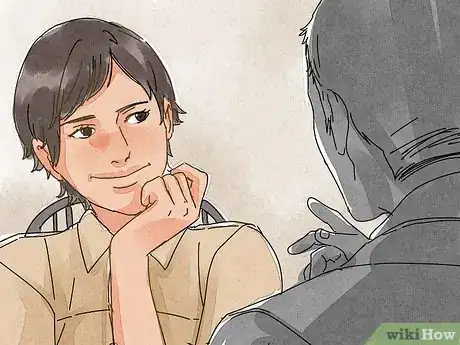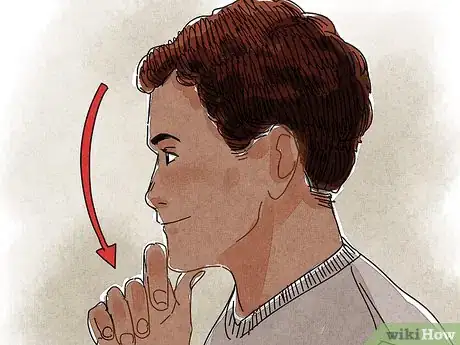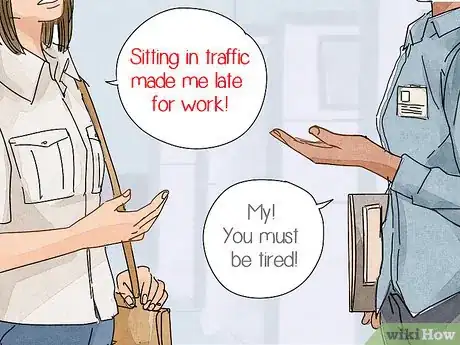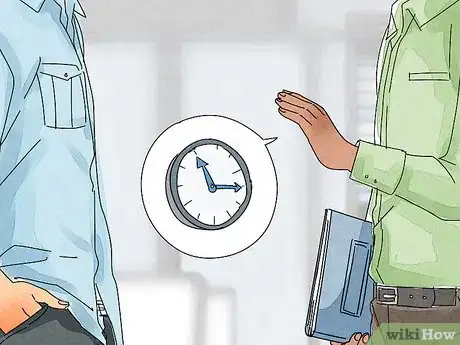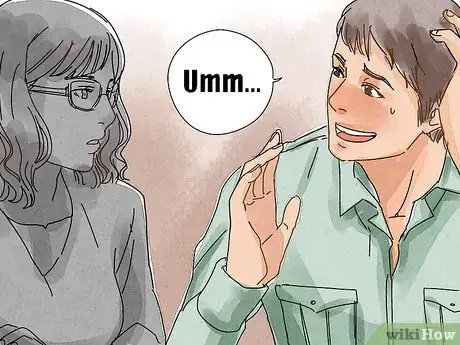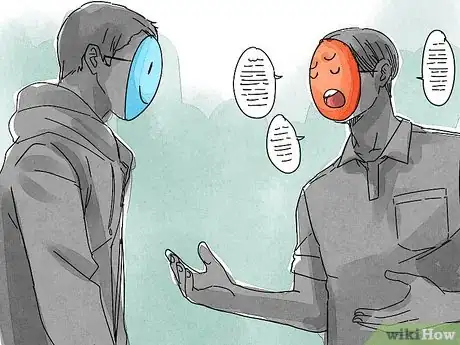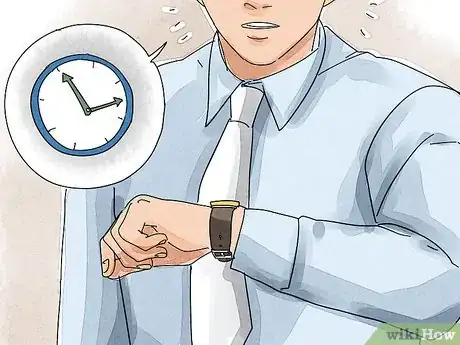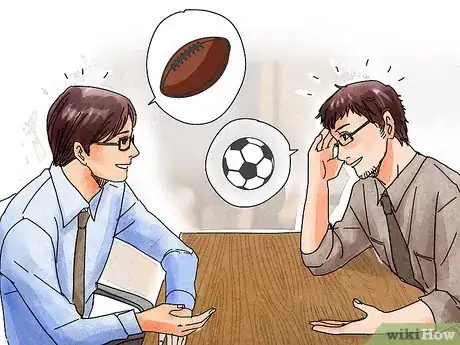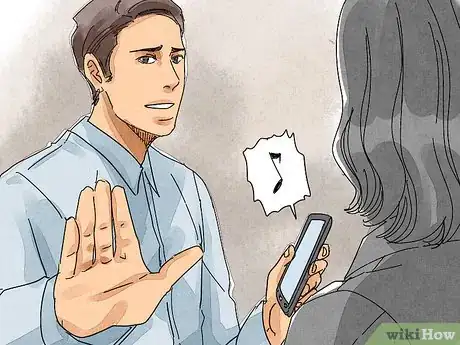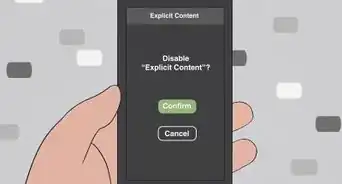This article was co-authored by Evan Parks, PsyD. Dr. Evan Parks is a Licensed Clinical Psychologist and an Adjunct Assistant Professor at The Michigan State University College of Human Medicine. With over 25 years of experience, he specializes in helping people manage chronic pain through the Acceptance and Commitment Therapy (ACT) Approach at Mary Free Bed Rehabilitation Hospital. He also has experience working with others on topics ranging from stress management to mental flexibility. Dr. Parks is also the author of Chronic Pain Rehabilitation: Active Pain Management That Helps You Get Back to the Life You Love. Dr.Parks holds a BA in Theology from Cedarville University, an MA in Counseling Psychology from Western Michigan University, and a PsyD in Clinical Psychology from The Forest Institute of Professional Psychology.
There are 13 references cited in this article, which can be found at the bottom of the page.
This article has been viewed 44,659 times.
Annoying people are a fact of life. There are times when you may feel like their captive audience and can’t get away easily or quickly. You can “fake it ‘til you escape it” with some good communication skills. Many of the strategies listed below are valuable communication techniques in their own right. By developing these skills, you may even find that you are less bothered by people’s behavior. You will be better able to manage difficult people.
Steps
Using Body Language to Show Interest
-
1Make eye contact. It makes the person feel like you are paying attention to them, and it makes you appear confident and trustworthy.[1]
-
2Smile. Smiling is a universal gesture across all cultures and conveys a positive feeling.
- Fake smiles are easy to spot, however, so it might help to think of something that makes you happy in order to genuinely smile around an irritating person![2]
Advertisement -
3Nod. Nodding while the other person is talking indicates that you are listening without you having to say anything, and can be a gesture of encouragement.[3]
-
4Lean forward. Leaning toward the person you are speaking shows interest. Conversely, slouching conveys disinterest. [4]
-
5Learn to control your body language. Certain signals like eye rolling or sighing, can indicate annoyance. Be conscious of what you are projecting.[5]
Utilizing Communication Skills
-
1Learn to paraphrase. Paraphrasing is an excellent way to indicate interest and generate empathy and understanding. It lets the person know you are listening. To paraphrase, you repeat back to the person what they said, using your own words.[6]
- Phrases like “I heard you say,” “it sounds like,” and “you must be feeling” indicate to the listener that you will be paraphrasing.
- A good paraphrase for “I’m so sick of sitting in traffic for an hour on my way to work!” might be “Wow, it sounds like your commute is really exhausting!”
- Paraphrasing requires active listening--you need to pay close attention--so this may feel draining with an especially annoying person. Consider looking at it as a skill-building opportunity (paraphrasing is a great communication tool). You also may not wish to use it for a great length of time.
-
2Ask questions. Questions show interest and engagement (even if you feel neither of these), and help the other person feel you are trying to connect with them.[7]
- This can also help you refocus the conversation to something you may find more tolerable. For example, “You mentioned your sister; how is she doing?”
-
3Be polite. You can still be respectful and kind to a person who drives you crazy. Most likely, they are not trying to annoy you intentionally.
- It is not rude to set boundaries, however. If your coworker has been talking nonstop for the past fifteen minutes, it’s okay to say, “I’m so sorry I need to cut this short, Maria, but I need to get back to work.”[8]
- Your behavior is only controlled by others if you allow it to happen. If you are the type of person who is loving, honest, kind, and authentic, demonstrate these qualities even when you're around difficult people and strangers.
-
4Use non-committal words and phrases to fill space. Words like “Uh-huh,” “yeah,” “wow,” “that’s crazy,” or “how fascinating” will do the trick. If you add nothing else to the conversation, the other person will likely lose interest in talking to you.
-
5Keep them at arm’s length. It is probably not best to divulge any more details than are absolutely necessary to someone you don’t enjoy talking to. This also helps keep interactions to a minimum.
-
6Change the subject. Is this person only obnoxious when discussing certain topics? Get them on a different track.
- For example, “I can’t say that the state senate race really interests me that much, Bob. But speaking of races, are you still running these days?”
-
7Interrupt. If you can’t get a word in edgewise, it’s okay to interrupt a monologue.[9]
- Apologize for interrupting and make your point: “I’m so sorry to interrupt, but I was hoping you could help me with this problem.”
-
8Pretend you’re in a play. Imagine you’re an actor, performing a scene with another actor who is playing the role of an annoying person. This helps depersonalize the interaction, and helps you remember that a scene doesn’t last forever![10]
-
9Stay positive. Keep a positive attitude when around the annoying person. Most likely, they are not aware how much their behavior bothers you.[11]
-
10Figure out what would make this person less annoying to speak with. If they constantly stand too close to you, tell them to step back. It’s possible that no one ever told them their behavior is a problem.
- For example, you could say, “Joe, I’ve noticed that whenever we talk I always feel like we are crammed in an elevator together. Would you mind backing up a bit?” Even a good-natured, “Hey man, back up!” may suffice.
- In many cases, annoying people are choosing more indirect methods to get their needs met. You can address this person by saying something like "The way you're acting is getting my attention, but not in a good way. It would be helpful for me if you just told me what you wanted."
-
11Have an exit strategy. It’s okay to end a conversation, especially if you have more pressing matters to attend to. Here are some ways to end it:
- Make an excuse. Look at your watch and “remember” you need to be somewhere. Say you need to get something to eat, or need to use the bathroom.[12]
- Say “It’s been so nice talking to you.” Even people with poor social skills will recognize this as a natural end to the conversation.
- Wait for a lull in the conversation. Then you could say, “Well, I should get going. Have a good day!”
- Blame yourself for not keeping up the conversation. For example, maybe you are a terrible multitasker. Try saying, “Jim, I’d love to talk more, but I can’t do a good job listening to you while I’m organizing these files! I’ve never been good at multitasking. I should probably get back to it.”
- Walk away from a conversation when it’s done. If you stay there, one or both of you may feel pressure to keep talking.
Dealing with Annoying People You See Frequently
-
1Find common ground. Whether you are making small talk at a party or with a relative, finding a shared interest can make annoying people more interesting to talk to.
- Stick to safe subjects. If you have a devoutly religious uncle, and you don’t practice any faith, don’t talk about religion! Change the subject if something controversial comes up.
- Think of a topic or hobby you are both interested in. If the cousin who only talks about himself plays guitar like you do, steer the conversation to what he’s enjoyed playing lately.
- Ask an annoying partygoer how they know the host or if you share any mutual friends.[13]
-
2Get distracted. Something in your environment may provide an excuse to end a conversation.
- Look at the refreshments at a party and say, “I need to get some of those brownies before they’re gone! Excuse me!”
- Blame noise level. If you are at a loud event, pretend you can’t hear the person. Then slip away.
- Work on something else while they’re talking. Make copies, straighten shelves. This sends the message that you are busy.
- Answer the phone: “I’m so sorry, I need to take this!” Respond to an email that just popped up.
-
3Enlist help. Other people can help you find a way out of an annoying conversation.
- If you are going to a party where you know an annoying person will be a guest, have a friend help you manage the situation. For example, you could tell your friend, “I’m going to talk to Kelly for ten minutes. After that, come and pull me away with an excuse.”
- Flag down a passing co-worker and ask a work-related question to interrupt the annoying person.
-
4Be polite. Even though the conversation may be annoying, it may be worth it--for work, social, or family reasons--to tough it out. You can find ways to be respectful and contribute to help keep the peace.
- Talk about yourself. Your family, in particular, may be interested in hearing what you have been up to. This also can help you steer the conversation.
- Ask your elders to share old stories. You may learn interesting things about their lives.
- Focus on the task at hand. If you need to deliver something to their desk, drop it off politely and leave.
- Don’t take rude behavior personally. If you work in a customer-centered job, you may have to deal with annoying people frequently. Politely address their concerns.[14]
Expert Q&A
-
QuestionHow do you distance yourself from annoying friends?
 Evan Parks, PsyDDr. Evan Parks is a Licensed Clinical Psychologist and an Adjunct Assistant Professor at The Michigan State University College of Human Medicine. With over 25 years of experience, he specializes in helping people manage chronic pain through the Acceptance and Commitment Therapy (ACT) Approach at Mary Free Bed Rehabilitation Hospital. He also has experience working with others on topics ranging from stress management to mental flexibility. Dr. Parks is also the author of Chronic Pain Rehabilitation: Active Pain Management That Helps You Get Back to the Life You Love. Dr.Parks holds a BA in Theology from Cedarville University, an MA in Counseling Psychology from Western Michigan University, and a PsyD in Clinical Psychology from The Forest Institute of Professional Psychology.
Evan Parks, PsyDDr. Evan Parks is a Licensed Clinical Psychologist and an Adjunct Assistant Professor at The Michigan State University College of Human Medicine. With over 25 years of experience, he specializes in helping people manage chronic pain through the Acceptance and Commitment Therapy (ACT) Approach at Mary Free Bed Rehabilitation Hospital. He also has experience working with others on topics ranging from stress management to mental flexibility. Dr. Parks is also the author of Chronic Pain Rehabilitation: Active Pain Management That Helps You Get Back to the Life You Love. Dr.Parks holds a BA in Theology from Cedarville University, an MA in Counseling Psychology from Western Michigan University, and a PsyD in Clinical Psychology from The Forest Institute of Professional Psychology.
Licensed Clinical Psychologist Focus your time and energy on being with the people who are important to you. Also, concentrate on being the kind of person you want to be and the type of character you want to live out. Look for people who support you in your journey and help you become stronger—we can only be happy if we are surrounded by other happy people.
Focus your time and energy on being with the people who are important to you. Also, concentrate on being the kind of person you want to be and the type of character you want to live out. Look for people who support you in your journey and help you become stronger—we can only be happy if we are surrounded by other happy people.
References
- ↑ http://money.usnews.com/money/blogs/outside-voices-careers/articles/2016-04-05/5-tips-to-improve-nonverbal-communication-at-meetings
- ↑ https://www.linkedin.com/pulse/smile-power-james-g-springer-cht
- ↑ https://www.psychologytoday.com/blog/emotional-fitness/201008/10-tips-create-powerful-non-verbal-communication
- ↑ http://money.usnews.com/money/blogs/outside-voices-careers/articles/2016-04-05/5-tips-to-improve-nonverbal-communication-at-meetings
- ↑ https://www.psychologytoday.com/blog/wander-woman/201308/how-deal-annoying-people
- ↑ http://www.people.vcu.edu/~krhall/resources/cnslskills.pdf
- ↑ http://www.forbes.com/sites/johnhall/2013/08/18/13-simple-ways-you-can-have-more-meaningful-conversations/
- ↑ https://www.psychologytoday.com/blog/the-couch/201204/5-steps-dealing-people-who-talk-too-much
- ↑ https://www.psychologytoday.com/blog/the-couch/201204/5-steps-dealing-people-who-talk-too-much
- ↑ http://socialself.com/outgoing-chapter-2
- ↑ http://www.businessnewsdaily.com/5867-ways-to-handle-annoying-co-workers.html
- ↑ http://www.forbes.com/sites/dailymuse/2015/08/24/21-ways-to-leave-a-never-ending-conversation-without-being-rude/
- ↑ http://www.succeedsocially.com/howtomingleatparties
- ↑ http://www.forbes.com/sites/thesba/2013/08/02/7-steps-for-dealing-with-angry-customers/

